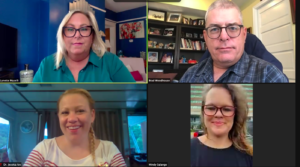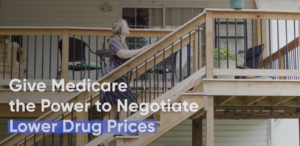Protect Our Care Releases New Fact Sheet As Part of Lower Rx Summer
Today, Protect Our Care is kicking off Week 5 of Lower Rx Summer with a fact sheet underscoring how high drug costs hurt people with disabilities. Throughout the week, Protect Our Care will demonstrate the urgency for reform to bring down drug prices for people with disabilities.
In June, Protect Our Care announced Lower Rx Summer as part of The Campaign to Reduce Drug Prices. Lower Rx Summer consists of themed weeks of action to demonstrate the urgent need for legislation to lower drug prices principally by giving Medicare the power to negotiate with drug companies for lower prices for all Americans.
Remaining Theme Weeks for Lower Rx Summer
Week 5 (July 5): How High Drug Prices Hurt People with Disabilities
Week 6 (July 12): How High Drug Prices Hurt People of Color
Week 7 (July 19): How High Drug Prices Hurt Small Businesses
Week 8 (July 26): How High Drug Prices Hurt Children
Week 9 (August 2): Expanding Medicare Benefits—Hearing, Vision, And Dental
Fact Sheet: How High Drug Prices Hurt People With Disabilities
High prescription drug costs disproportionately hurt the 61 million Americans living with one or more disabilities. The drug pricing crisis across the United States wreaks havoc for millions, particularly those making less than $40,000 per year. Approximately 85 percent of those on Medicaid with a disability are living on annual incomes of less than $25,760, making the surge in drug costs particularly painful. Not only do prescription drug costs create significant financial hardship, but increasing costs have the capacity for deadly outcomes. A 2021 study found that the smallest increase in out-of-pocket medication costs created alarming drops in patients taking drugs as instructed and tragic increases in mortality rates.
Despite these disastrous outcomes, pharmaceutical corporations have continued ramping up the cost of prescription drugs at the detriment of people with disabilities. Big Pharma has been particularly ruthless towards those suffering from rheumatoid arthritis. Humira, a commonly used RA medication manufactured by AbbVie, has experienced 27 price increases and Medicare beneficiaries using the drug paid an estimated average of $5,471 in annual out-of-pocket costs in 2019.
This outrageous profiteering at the expense of people with disabilities is simply unacceptable. These practices demonstrate the urgent need for Congress to pass the Lower Drug Costs Now Act (H.R. 3), which would provide the federal government the necessary power to negotiate prescription drug prices. Negotiation would save the government and patients nearly $600 billion on prescription drug costs, which could be reinvested to strengthen health care for millions of Americans. There is also action that could be taken today by the 12 states refusing to accept Medicaid expansion. If Republicans quit their needless blockade, a minimum of 500,000 Americans with disabilities would be able to enroll in Medicaid and access essential healthcare. The time for bold action is now.
KEY POINTS
- Americans with disabilities are struggling to afford rising drug costs on fixed incomes. 61 million Americans have a disability, with millions covered by Medicaid and Medicare. Many of these individuals live on a fixed income, with nearly 85 percent of nonelderly Medicaid beneficiaries with disabilities living on less than $25,760 per year.
- Soaring out-of-pocket costs for specialty drugs hurt people with disabilities. In January of 2021, drugmakers hiked the price of nearly 1,000 drugs, while Americans with disabilities were left struggling to afford needed medications. A recent study found that increasing out-of-pocket costs by just $10 produced a 33 percent increase in mortality.
- The time to rein in drug manufacturers and expand coverage is now. Medicaid expansion in the remaining holdout states would provide coverage for at least 500,000 people with disabilities. When living in an expansion state, these individuals are 6 percentage-points more likely to be employed. No one should be forced to live below the FPL in order to have access to lifesaving medical coverage.
For the full fact sheet, click here.



